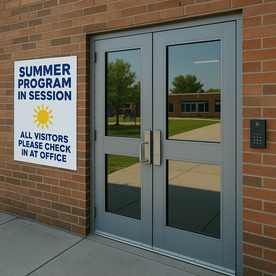
When the school year ends, the learning doesn’t always stop. From summer camps and enrichment classes to meal distribution programs and facility rentals, school campuses stay active long after the final bell.
But while the student body might shrink, the security risks don’t go away. In fact, with fewer staff and less structure, summer school campus security can become more complex—and easier to overlook.
At SSP, we help educational institutions of all sizes manage the unique safety challenges of summer programs. Whether you’re a school administrator, facilities manager, or program coordinator, this guide will help you keep your campus secure—and your community confident.
k
k
☀️ Why Summer Is a Different Kind of Security Season
During the school year, you likely have:
-
A consistent bell schedule
-
Clearly defined pick-up/drop-off routines
-
Staff in every building and hallway
-
A known list of who should (and shouldn’t) be on campus
In the summer, things shift:
-
Programs may only use part of the campus
-
Staff often rotate or come from third-party providers
-
Students and visitors may not be familiar with school policies
-
Entry points and supervision levels vary widely by day
All of this makes clear, consistent physical security protocols even more important.
k
k
✅ Summer School Campus Security Best Practices
🔐 1. Define and Limit Points of Entry
Don’t leave multiple doors open “just in case.” Choose 1–2 designated access points and keep all others:
-
Locked and monitored
-
Alarmed or camera-covered
-
Clearly marked “No Entry” or “Staff Only”
Tip: Use access control readers or mobile credentials for approved staff and contractors.
k
k
📋 2. Establish a Temporary Visitor Management Policy
Whether it’s a camp counselor, vendor, or parent volunteer, everyone should check in—even if the building feels “informal.”
What to include:
-
Digital or paper sign-in with name, time, and reason for visit
-
Issued temporary badges or wristbands
-
Instructions on which areas they’re allowed to access
-
Emergency procedures in case of a drill or lockdown
Bonus: If your school already has a visitor management system, check that it’s active during summer months.
k
k
🧒 3. Keep Student Zones Separated From Public or Rental Areas
If your school rents out gymnasiums, fields, or cafeterias to the public during summer, make sure:
-
Student-only areas are secured with locks or badge readers
-
Schedules are staggered to prevent overlap
-
Public access is limited to specific hours and entry points
This protects both your liability—and your students.
k
k
🎥 4. Use Cameras to Monitor Activity (Even If You’re Offsite)
With fewer staff on campus, it’s harder to monitor every corner. Strategic surveillance helps:
-
Deter unauthorized entry
-
Monitor movement in low-traffic areas
-
Provide evidence in case of an incident
k
k
Look for cameras that integrate with mobile apps so your facilities team can keep an eye on things, even while working across multiple schools.
🚸 5. Train Summer Program Staff on Basic Security Protocols
Even if your summer programs are run by outside organizations, your school is still responsible for what happens on-site.
Host a short orientation to review:
-
How to use secured entry
-
What to do in a lockdown or emergency
-
Where students are allowed to go (and not go)
-
Who to contact if they see something suspicious
Security isn’t just technology—it’s shared awareness.
k
k
🛠️ Don’t Forget Facility Maintenance & Construction Zones
Many schools use summer as a time for upgrades or deep maintenance. If your facility will have contractors or renovations happening while summer programs are running:
-
Secure work zones with fencing or locked doors
-
Require contractor credentials or access badges
-
Ensure emergency exits remain accessible and code-compliant
-
Monitor material storage to prevent theft or misuse
Renovations bring tools, wiring, and open walls—not exactly kid-friendly.
k
k
Final Thoughts: Safety Shouldn’t Take a Summer Vacation
Your school’s role doesn’t end when classes do—and neither should your security planning. A safe, well-managed summer campus gives families peace of mind, builds trust in your leadership, and protects the people who rely on your facilities year-round.
At SSP, we work with K–12 schools and districts to design scalable, seasonal security solutions that work just as well in July as they do in September.
🏫 Hosting summer programs on your campus?
Let SSP help you secure your space and simplify your process.
Book a consultation


